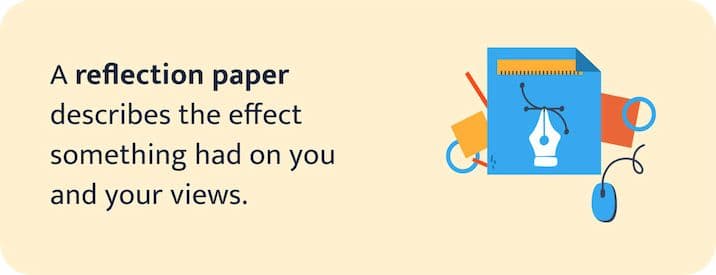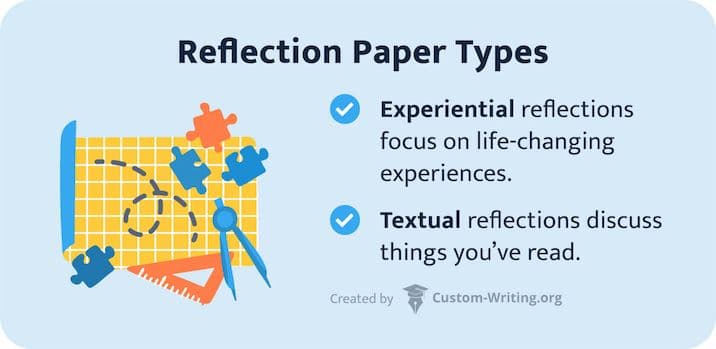Free Reflection Paper Generator for Students
Need help with your writing assignment? We've got your back! This free reflection paper generator will help you craft a fantastic essay, get inspiration, and save time.
🤖 Free Reflection Paper Generator: How to Use
- Choose your assignment type.
- Enter the topic of your paper.
- Add background information or study materials if necessary.
- Press "Generate" to get a well-written and personalized text.
✨ Reflection Paper Generator's Benefits
Here's what makes our reflection paper generator the best of its kind:
| 💸 100% free | No need to spend money on paid generators – use ours for free! |
|---|---|
| 💪 Unlimited | This reflection paper tool can create as many samples as you want. |
| 🛠️ Customizable | Use advanced options to get the best results. |
| 💎 Original | All essays our tool creates are unique. |
| 🧚 Inspirational | Our reflection paper generator can make a model text on any topic. |
😎 How Our Reflection Paper Generator's AI Works
Our tool uses an advanced language model that can generate texts by predicting what words are more likely to come next. This type of AI is at the heart of many state-of-the-art chatbots like ChatGPT.
The main difference between our free reflection paper generator and ChatGPT is that chatbots require you to write precise requests. If you want specific and relevant results, you must write very detailed prompts, which is a challenging and time-consuming process.
In contrast, our tool automatically creates perfect instructions for the AI. It formulates them in a way that ensures customized and relevant results. With the help of our generator, you will get a fantastic reflection paper sample quickly and conveniently.
📚 What Is a Reflection Paper?
A reflection paper is an academic essay expressing your opinion regarding a specific event or text. For instance, you may be asked to reflect on how a particular experience or a book has shaped your views on a subject.

Such essays are fun to write since there are no right or wrong answers. Besides, this kind of writing favors individual expression rather than summarizing the opinions of others.
Types of Reflective Writing
- Experiential reflection focuses on your personal experiences and observations.
- Textual (or reading) reflection involves analyzing a written text.
Our generator can create perfect examples of experiential and textual reflection papers. Try it out and see for yourself!
✍️ How to Write a Reflection Paper
If it's your first time working on a reflective paper, this handy guide will help you. Follow these five steps to develop an excellent reflective essay.
The first step is to decide what experience or text you want to write about. It's best to choose something that:
- Had a profound impact on you,
- Helped you grow as a person,
- Challenged your beliefs.
Regarding interpretation, experiential and textual reflective essays require different approaches. Below, you'll find questions that will help you stay on track.
Questions for reflecting on an experience:
- What did you want to learn from this experience?
- What new things did you learn from it?
- What did you learn about yourself?
- What would you do differently next time?
Questions for reflecting on a text:
- What ideas stood out for you?
- What has influenced your understanding of the text?
- Does the text support what you already thought?
- How does the text challenge your ideas and assumptions?
The next step is to find a unifying idea or argument that your reflection will convey. Choosing an interesting theme is essential since it'll set the tone of the whole paper and make it more engaging.
A clear structure is essential for your paper's success. Take time to create an outline or a mind map showing connections between your ideas to ensure everything flows well.
Finally, you can start writing your paper. Your essay should have three parts: an introduction, body paragraphs, and a conclusion. Keep reading to learn more about them!
🚀 Reflection Paper Format
Now, let's take a look at each element of your reflection essay. In addition to the information below, we recommend creating a sample reflection paper with the help of our generator. This will help you understand your assignment's structure and provide you with additional inspiration.

Introduction
The introduction should clearly state the topic and the purpose of your paper to give readers an idea of what to expect.
Here's what you should include in this part:
- Background. Give enough information for the reader to understand the topic you're discussing.
- Thesis. Finish the introduction with a statement that outlines the main ideas of your essay.
Main Body
After introducing the topic and the thesis, it's time to elaborate on them and provide examples.
Here's what you can discuss in the body paragraphs:
- Reflect on the topic from a personal perspective.
- Mention the expectations you had regarding the topic.
- Add examples to strengthen your statements and give the reader a better understanding of your message.
Conclusion
The conclusion is the final part of your reflection that summarizes the entire paper. There are several ways you can frame it:
- Describe what you've learned from the experience or text by comparing it to your expectations.
- Explain how the newfound knowledge will influence your future actions.
- Share significant insights you've gained and how they changed your views.
- Think about what you've learned through the process of reflection itself.
References
This section is optional. You'll need to include it in your paper if you used information from other sources. Make sure to arrange the list of references according to the format your professor wants you to use.
❌ Reflection Paper Writing: What to Avoid
To write a perfect paper, make sure to avoid the following:
- Avoid writing a stream of consciousness. While your essay is supposed to capture emotional experiences, it should have a clear structure and organization.
- Avoid treating it like a research paper. A reflection essay may include some research, but its main focus is to tell your story.
- Avoid treating it like a book review. Reflective writing focuses on your understanding of the text, not its summary or retelling.
- Avoid trying to include everything. Instead, clearly define the scope of your paper based on your opinions and feelings.
- Avoid focusing on the past. It's better to focus on how you've grown and gained insights that can be applied in the future.
Another way to write a brilliant essay is to use our tool for inspiration. All you need to do is fill in the fields, and our reflection paper generator's AI will take care of the rest.
You can also use our essay extender and topic sentence maker to improve your writing even further. Try them out, and good luck!
Updated: